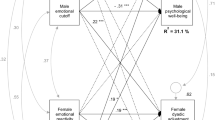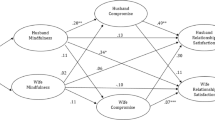Abstract
This study examined two depression-related individual difference variables, Dependency and Self-Criticism, in relation to communication about the self and a romantic partner. Sixty-five women varying on Dependency and Self-Criticism were assessed with their partners during an interaction in which they appraised their own and each others' performance on a previous conflict resolution task. Irrespective of current depression levels, highly self-critical women were found to emit higher proportions of negative statements about their own and their partners' performance. Partners responded, in turn, with more negative feedback about the self-critic. Highly dependent women were not distinguished with respect to their own behavior, but elicited less negative feedback from their partners. The roles of Dependency and Self-Criticism in the elucidation of different interpersonal cycles of depression are discussed.
Similar content being viewed by others
REFERENCES
Albersnagel, F. A. (1988). Belten and musical mood induction procedures: A comparison with accessibility of thought associations. Behaviour Research and Therapy, 26, 79-96.
Andrews, J. D. W. (1989). Psychotherapy of depression: A self-confirmation model. Psychological Review, 96, 576-607.
Beck, A. T., Steer, R., & Garbin, M. (1988). Psychometric properties of the Beck Depression Inventory: Twenty-five years of evaluation. Clinical Psychology Review, 8, 77-100.
Beck, A. T., Ward, C. H., Mendelson, M., Mock, J. E., & Erbaugh, J. K. (1961). An inventory for measuring depression. Archives of General Psychiatry, 4, 561-571.
Blaney, P. H., & Kutcher, G. S. (1991). Measures of depressive dimensions: Are they interchangeable? Journal of Personality Assessment, 56, 502-512.
Blatt, S. J. (1974). Levels of object representation in anaclitic and introjective depression. Psychoanalytic Study of the Child, 24, 107-157.
Blatt, S. J. (1995). The destructiveness of perfectionism: Implications for the treatment of depression. American Psychologist, 50, 1003-1020.
Blatt, S. J., & Bers, S. A. (1993). The sense of self in depression: A psychodynamic perspective. In Z. V. Segal & S. J. Blatt (Eds.), The self in emotional distress (pp. 171-210). New York: Guilford Press.
Blatt, S. J., D'Affliti, J. P., & Quinlan, D. M. (1976). Experiences of depression in normal young adults. Journal of Abnormal Psychology, 85, 383-389.
Blatt, S. J., & Shichman, S. (1983). Two primary configurations of psychopathology. Psychoanalysis and Contemporary Thought, 6, 187-254.
Blatt, S. J., & Zohar, A. H., Quinlan, D. M., Zuroff, D. C., & Mongrain, M. (1995). Subscales within the Dependency factor of the Depressive Experiences Questionnaire. Journal of Personality Assessment, 64, 319-339.
Blatt, S. J., & Zuroff, D. C. (1992). Interpersonal relatedness and self-definition: Two prototypes for depression. Clinical Psychology Review, 12, 527-562.
Bornstein, R. F. (1992). The dependent personality. Psychological Bulletin, 112, 3-23.
Bornstein, R. F. (1994). Adaptive and maladaptive aspects of dependency: An integrative review. American Journal of Orthopsychiatry, 64, 622-635.
Bornstein, R. F. (1998). Depathologizing dependency. Journal of Nervous and Mental Disease, 186, 67-73.
Bumberry, W., Oliver, J. M., & McClure J. N. (1978). Validation of the Beck Depression Inventory in a university population using psychiatric estimate as the criterion. Journal of Consulting and Clinical Psychology, 46, 150-155.
Burchill, S. A. L., & Stiles, W. B. (1988). Interactions of depressed college students with their roommates: Not necessarily negative. Journal of Personality and Social Psychology, 55, 410-419.
Cacioppo, J., & Petty, R. (1981). Social psychological procedures for cognitive response assessment: The thought-listing technique. In T. Merluzzi, C. Glass, & M. Genes (Eds.), Cognitive assessment (pp. 309-342). New York: Guilford Press.
Cheung, P. P., & Hudson, W. W. (1982). Assessment of marital discord in social work practice: A revalidation of the Index of Marital Satisfaction. Journal of Social Service Research, 5, 101-118.
Cohen, J., & Cohen, P. (1983). Applied multiple regression: Correlational analysis for the behavioral sciences. Hillsdale, NJ: Erlbaum.
Coiro, M. J., & Gottesman, I. I. (1996). The diathesis and/or stressor role of expressed emotion in affective illness. Clinical Psychology: Science and Practice, 3, 310-322.
Coyne, J. C. (1976). Toward an interactional description of depression. Psychiatry, 33, 28-40.
Coyne, J. C., Burchill, S. A. L., & Stiles, W. B. (1991). An interactional perspective on depression. In C. R. Snyder & D. R. Forsyth (Eds.), Handbook of social and clinical psychology (pp. 327-349). Elmsford, NY: Pergamon Press.
Coyne, J. C., & Whiffen, V. E. (1995). Issues in personality as diathesis for depression: The case of sociotropy-dependency and autonomy-self-criticism. Psychological Bulletin, 118, 358-378.
Dykman, B. M., Horowitz, L. M., Abramson, L. Y., & Usher, M. (1991). Schematic and situational determinants of depressed and nondepressed students' interpretation of feedback. Journal of Abnormal Psychology, 100, 45-55.
Fichman, L., Koestner, R., & Zuroff, D. C. (1996). Dependency, self-criticism, and perceptions of inferiority at summer camp: I'm even worse than you think. Journal of Youth and Adolescence, 25, 113-126.
Fleiss, J. L. (1971). Measuring nominal scale agreement among many raters. Psychological Bulletin, 76, 378-382.
Fox, J. (1997). Applied regression analysis, linear models, and related methods. Thousand Oaks, CA: Sage.
Franche, R., & Dobson, K. (1992). Self-criticism and interpersonal dependency as vulnerability factors to depression. Cognitive Therapy and Research, 16, 419-435.
Franks, P., Shields, C., Campbell, T., McDaniel, S., Harp, J., & Botelho, R. J. (1992). Association of social relationships with depressive symptoms: Testing an alternative to social support. Journal of Family Psychology, 6, 49-59.
Giesler, R. B., & Swann, W. B., Jr. (1999). Striving for confirmation: The role of self-verification in depression. In T. Joiner & J. C. Coyne (Eds.), The interactional nature of depression (pp. 189-217). Washington, DC: American Psychological Association.
Gleicher, F., & Weary, G. (1991). Effect of depression on quantity and quality of social inferences. Journal of Personality and Social Psychology, 61, 105-114.
Gotlib, I. H., & Hammen, C. L. (1992). Psychological aspects of depression: Toward a cognitive-interpersonal integration. New York: Wiley.
Gotlib, I. H., & Robinson, L. A. (1982). Responses to depressed individuals: Discrepancies between self-report and observer-rated behavior. Journal of Abnormal Psychology, 91, 231-240.
Gotlib, I. H., & Whiffen, V. E. (1989). Depression and marital functioning: An examination of specificity and gender differences. Journal of Abnormal Psychology, 98, 23-30.
Gottman, J. M. (1979). Marital interactions: Experimental investigations. New York: Academic Press.
Hautzinger, M., Linden, M., & Hoffman, N. (1982). Distressed couples with and without a depressed partner: An analysis of their verbal interaction. Journal of Behavior Therapy and Experimental Psychiatry, 13, 307-314.
Hokanson, J. E., Rubert, M. P., Welker, R. A., Hollander, G. R., & Hedeen, C. (1989). Interpersonal concomitants and antecedents of depression among college students. Journal of Abnormal Psychology, 98, 209-217.
Hooley, J. M., & Teasdale, J. D. (1989). Predictors of relapse in unipolar depressives: Expressed emotion, marital distress, and perceived criticism. Journal of Abnormal Psychology, 98, 229-235.
Hudson, W. W. (1982). The clinical measurement package: A field manual. Chicago: Dorsey Press.
Lakey, B., & Ross, L. T. (1994). Dependency and self-criticism as moderators of interpersonal and achievement stress: The role of initial dysphoria. Cognitive Therapy and Research, 18, 581-599.
Leary, T. (1957). Interpersonal diagnosis of personality. New York: Ronald Press.
Lewinsohn, P. M. (1974). A behavioral approach to depression. In R. J. Friedman & M. Katz (Eds.), The psychology of depression: Contemporary theory and research. Washington, DC: Wiley.
Lewinsohn, P. M., Mischel, W., Chaplin, W., & Barton, R. (1980). Social competence and depression: The role of illusory self-perceptions. Journal of Abnormal Psychology, 89, 203-212.
Marcus, D. K., & Nardone, M. E. (1992). Depression and interpersonal rejection. Clinical Psychology Review, 12, 433-449.
Mongrain, M. (1993). Dependency and self-criticism located within the five-factor model of personality. Personality and Individual Differences, 15, 455-462.
Mongrain, M. (1998). Parental representations and support-seeking behaviors related to dependency and self-criticism. Journal of Personality, 66, 151-173.
Mongrain, M., Vettese, L. C., Shuster, B., & Kendal, N. (1998). Perceptual biases, affect, and behavior in the relationships of dependents and self-critics. Journal of Personality and Social Psychology, 75, 230-241.
Mongrain, M., & Zuroff, D. C. (1989). Cognitive vulnerability to depressed affect in dependent and self-critical college women. Journal of Personality Disorders, 3, 240-251.
Mongrain, M., & Zuroff, D. C. (1994). Ambivalence over emotional expression and negative life events: Mediators of depressive symptoms in dependent and self-critical individuals. Personality and Individual Differences, 16, 447-458.
Mongrain, M., & Zuroff, D. C. (1995). Motivational and affective correlates of dependency and self-criticism. Personality and Individual Differences, 18, 347-354.
Myers, J. L. (1966). Fundamentals of experimental design. Boston: Allyn and Bacon.
Nietzel, M. T., & Harris, M. J. (1990). Relationship of dependency and achievement/autonomy to depression. Clinical Psychology Review, 10, 279-297.
Notarius, C. I., & Markman, H. J. (1981). The couples' interaction scoring system. In E. E. Filsinger & R. A. Lewis (Eds.), Assessing marriage: New behavioral approaches (pp. 112-127). Beverly Hills, CA: Sage.
Overholser, J. C., & Freiheit, S. R. (1994). Assessment of interpersonal dependency using the Millon Clinical Multiaxial Inventory-II (MCMI-II) and the Depressive Experiences Questionnaire. Personality and Individual Differences, 17, 71-78.
Powers, T. A., & Zuroff, D. C. (1988). Interpersonal consequences of overt self-criticism: A comparison with neutral and self-enhancing presentations of self. Journal of Personality and Social Psychology, 54, 1054-1062.
Robins, C. (1995). Personality-event interaction models of depression. European Journal of Personality, 9, 367-378.
Rude, S. S., & Burnham, B. L. (1995). Connectedness and neediness: Factors of the DEQ and SAS dependency scales. Cognitive Therapy and Research, 19, 323-340.
Ruscher, S. M., & Gotlib, I. H. (1988). Marital interaction patterns of couples with and without a depressed partner. Behavior Therapy, 19, 455-470.
Segrin, C., & Abramson, L. Y. (1994). Negative reactions to depressive behaviors: A communication theories analysis. Journal of Abnormal Psychology, 103, 655-668.
Swann, W. B., Jr. (1990). To be adored or to be known: The interplay of self-enhancement and self-verification. In R. M. Sorrentino & E. T. Higgins (Eds.), Handbook of motivation and cognition (Vol. 2, pp. 408-480). New York: Guilford Press.
West, S. G., Aiken, L. S., & Krull, J. L. (1996). Experimental personality designs: Analysing categorical by continuous variable interactions. Journal of Personality, 64, 1-48.
Zuroff, D. C., & deLorimier, S. (1989). Ideal and actual romantic partners of women varying in dependency and self-criticism. Journal of Personality, 57, 825-846.
Zuroff, D. C.,& Duncan, N. (in press). Self-criticism and conflict resolution in romantic couples. Canadian Journal of Behavioural Science.
Zuroff, D. C., & Fitzpatrick, D. K. (1995). Depressive personality styles: Implications for adult attachment. Personality and Individual Differences, 18, 253-265.
Zuroff, D. C., & Franko, D. L. (1986, April). Depressed and test anxious students' interactions with friends: Effects of dependency and self-criticism. Paper presented at the Eastern Psychological Association Convention, New York.
Zuroff, D. C., & Giannopoulos, C. (1990). Negative affect in the romantic relationships of dependent and self-critical women. Paper presentation at the Canadian Psychological Association, Ottawa, Canada.
Zuroff, D. C., & Mongrain, M. (1987). Dependency and self-criticism: Vulnerability factors for depressive affective states. Journal of Abnormal Psychology, 96, 14-22.
Zuroff, D. C., Moskowitz, D. S., Wielgus, M. S., Powers, T. A., & Franko, D. L. (1983). Construct validation of the Dependency and Self-Criticism scales of the Depressive Experiences Questionnaire. Journal of Research in Personality, 17, 226-241.
Zuroff, D. C., Stotland, S., Sweetman, E., Craig, J., & Koestner, R. (1995). Dependency, self-criticism, and social interactions. British Journal of Clinical Psychology, 34, 543-553.
Author information
Authors and Affiliations
Rights and permissions
About this article
Cite this article
Vettese, L.C., Mongrain, M. Communication About the Self and Partner in the Relationships of Dependents and Self-Critics. Cognitive Therapy and Research 24, 609–626 (2000). https://doi.org/10.1023/A:1005587009681
Issue Date:
DOI: https://doi.org/10.1023/A:1005587009681




